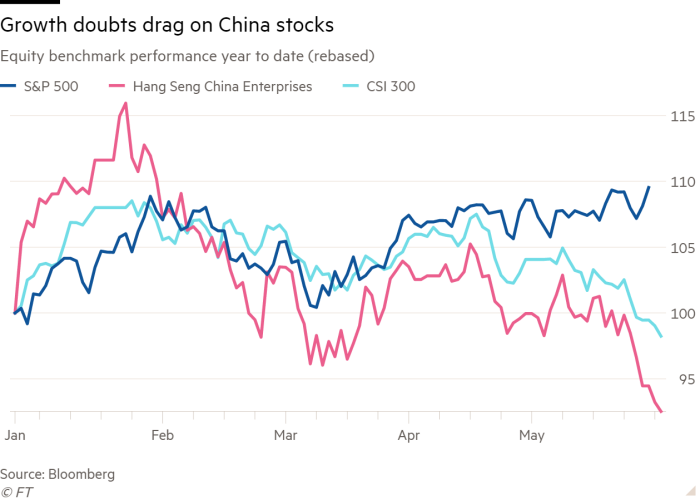Wall Street futures rose sharply on Tuesday, as traders were encouraged by news that US policymakers had agreed a deal on the debt ceiling, with the bill set to face Congress this week.
Contracts tracking the technology-heavy Nasdaq 100 rose 1.4 per cent ahead of the New York open, while those tracking the benchmark S&P 500 added 0.7 per cent, reaching their highest level since August.
The rise was bolstered by Saturday’s deal between US lawmakers and the White House, which would raise the country’s $31.4tn debt ceiling for two years until after the next presidential election in late 2024.
Although the bipartisan bill still needs to pass both chambers of Congress in the coming week, with traders poised for the first vote in the House on Wednesday, it helped ease pressure on US Treasuries.
The yield on policy-sensitive two-year bills fell 0.08 percentage points to 4.51 per cent. The yield on the benchmark 10-year note was down 0.11 percentage points to 3.71 per cent. Bond yields fall as prices rise.
Meanwhile, in Europe, Germany’s Dax gained 0.5 per cent, propped up by strong technology and energy sector performances, although the Cac 40 lost 0.4 per cent and the FTSE 100 dropped 0.5 per cent. The region-wide Stoxx 600 was flat.
Last week’s rally in technology stocks, prompted by growing enthusiasm around the AI industry, gave the Dax “a bit more upside”, said Chris Beauchamp, chief market analyst at IG Group.
“The Nasdaq and the Dax aren’t exactly the obvious bedfellows, but they seem to be at the moment,” he added.
In foreign exchange markets the Turkish lira weakened to 20.39 against the US dollar, hitting a new record low after President Recep Tayyip Erdoğan secured victory in the country’s election over the weekend.
Meanwhile, the Hang Seng China Enterprises index was down during Asian trading on Tuesday, pushing it 20 per cent lower from its peak in January. That temporarily placed it in bear market territory, although it later rallied to close up 0.5 per cent.
China’s benchmark CSI 300 index of Shanghai- and Shenzhen-listed stocks was also down more than 10 per cent from its peak this year, matching the technical definition of a market correction, although it also later rallied to close marginally up.
Pressure on Chinese stocks follows mounting worries over the outlook for the world’s second-largest economy as tensions rise between Washington and Beijing.

The relentless sell-off reflects a growing consensus among investors that the country’s economic recovery is losing steam, roughly half a year after Beijing abandoned President Xi Jinping’s disruptive zero-Covid 19 policy.
Winnie Wu, China equity strategist at Bank of America, said clients had described many Chinese stocks as “too cheap to short but not good enough to go long”.
Wu said that while valuations for China shares had become attractive, the recovery remained weaker than anticipated and the economy was likely to continue underperforming without more substantial state support.
Stay connected with us on social media platform for instant update click here to join our Twitter, & Facebook
We are now on Telegram. Click here to join our channel (@TechiUpdate) and stay updated with the latest Technology headlines.
For all the latest Business News Click Here
For the latest news and updates, follow us on Google News.
